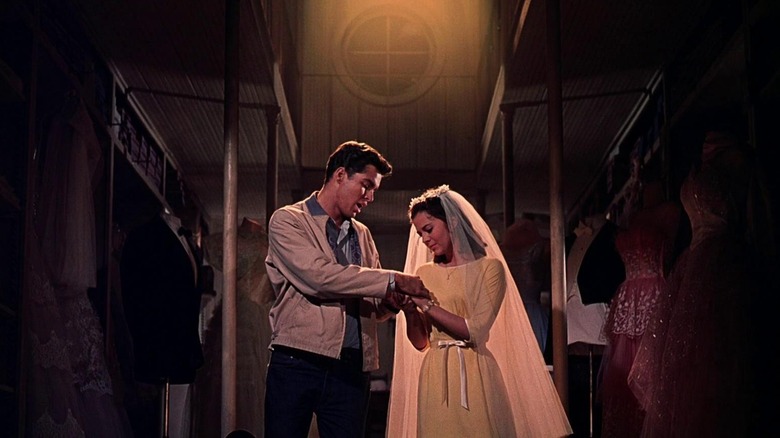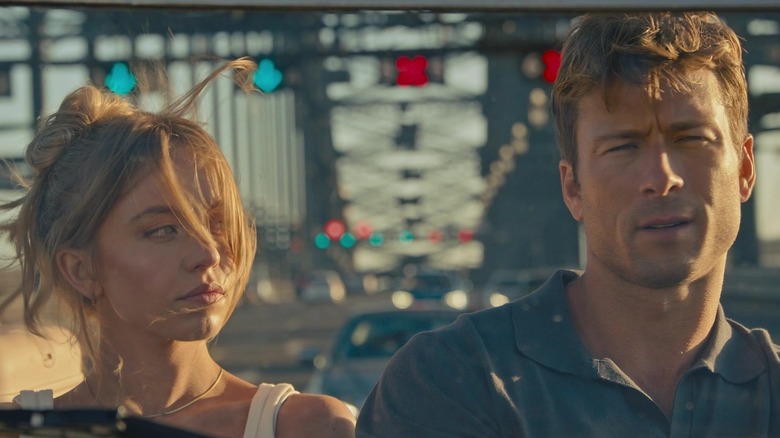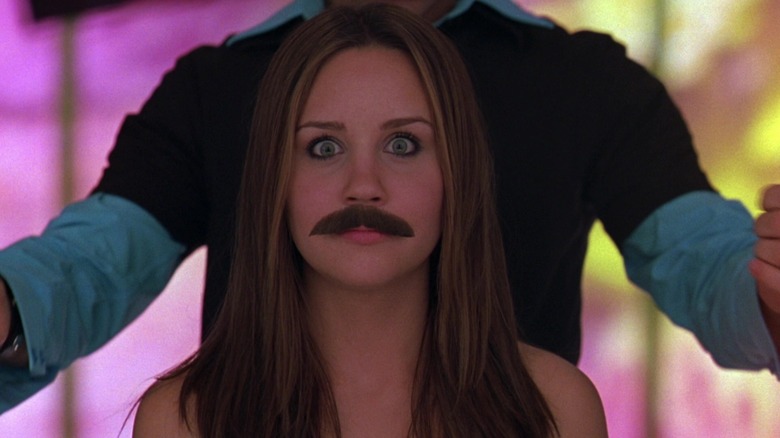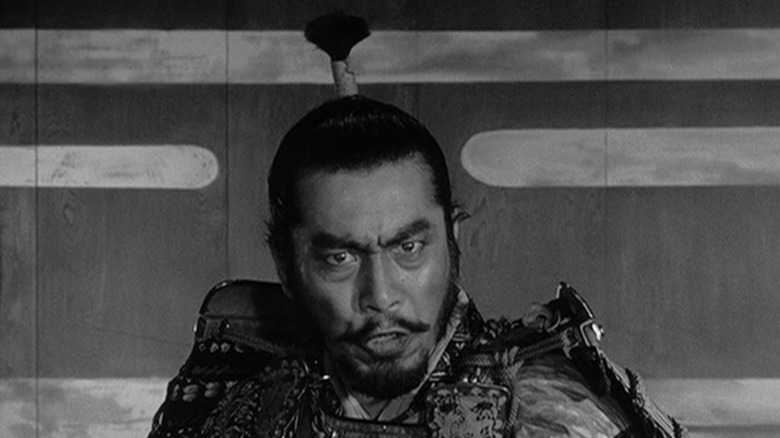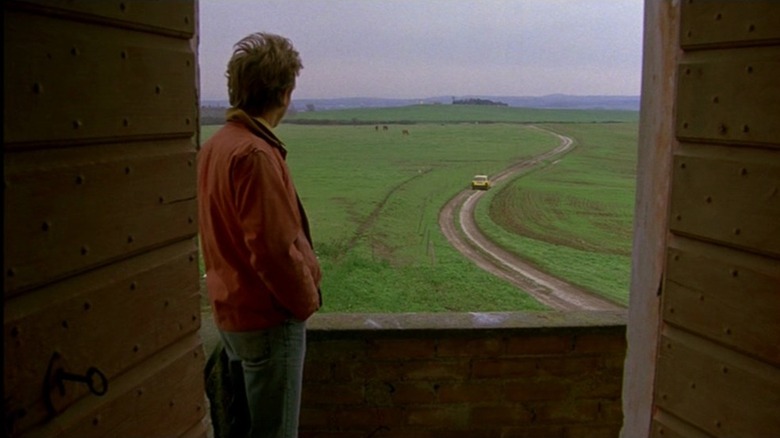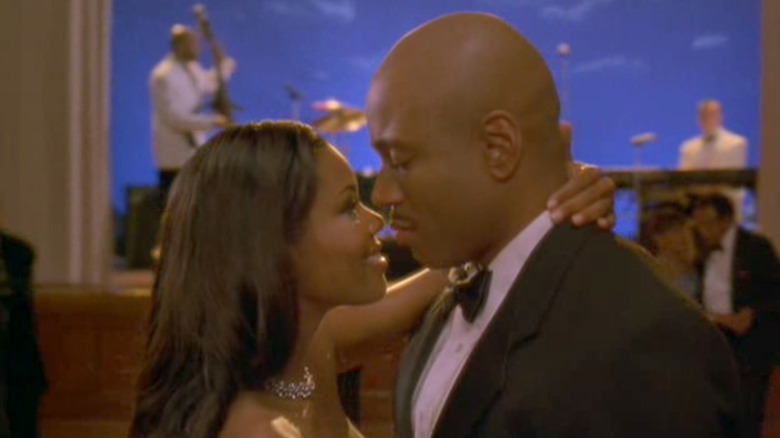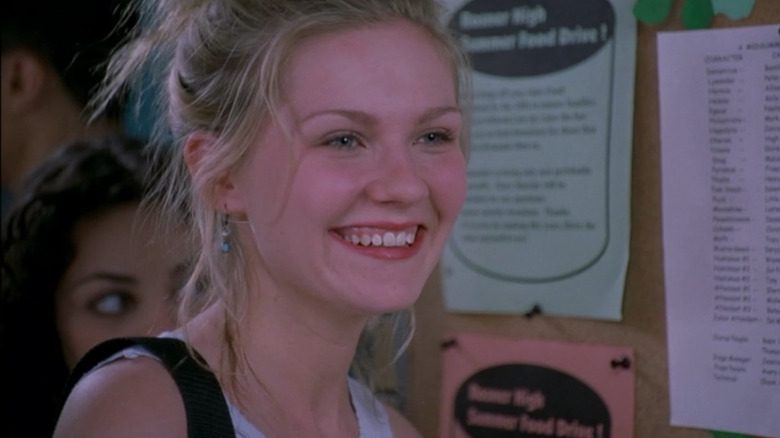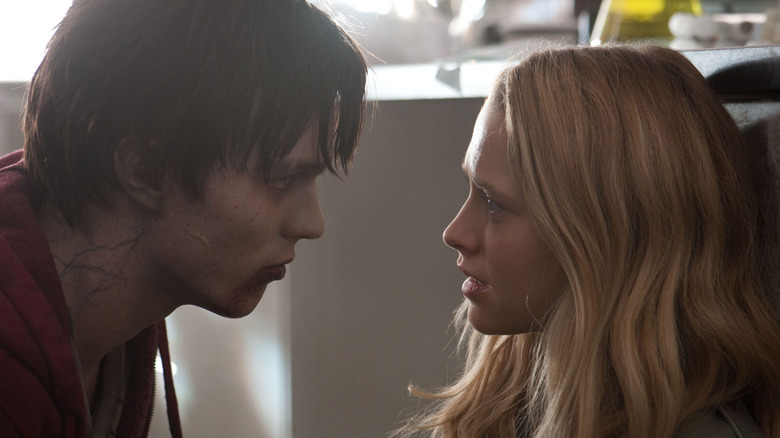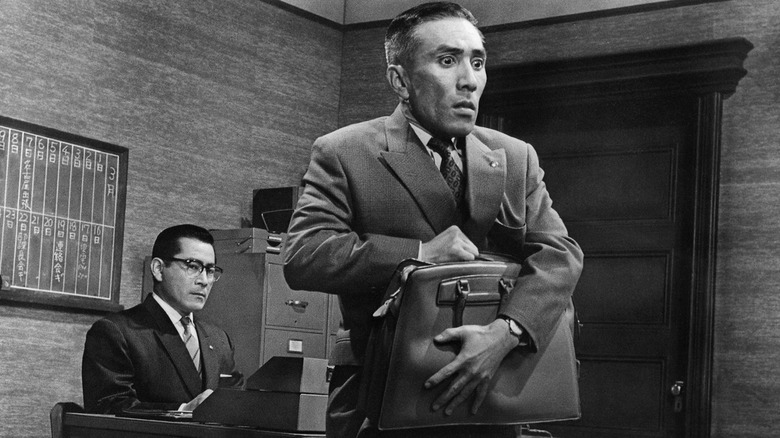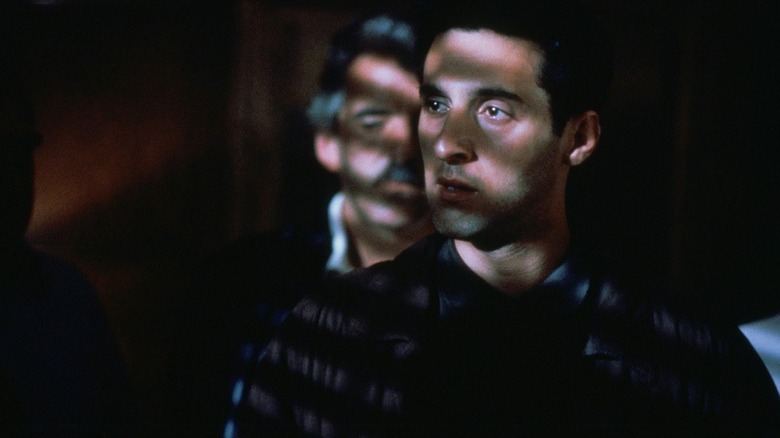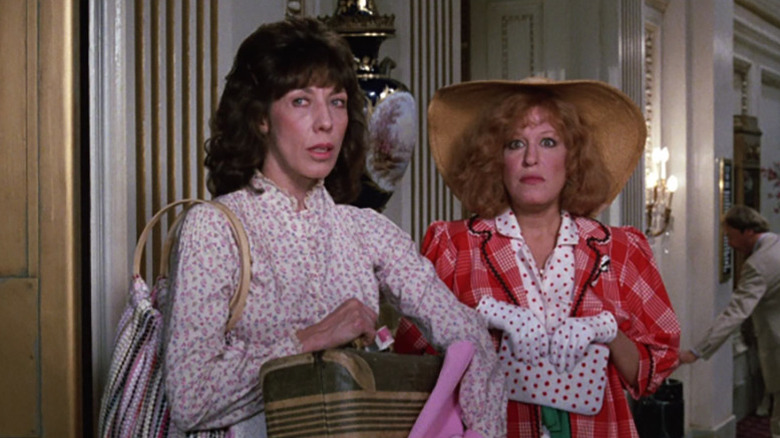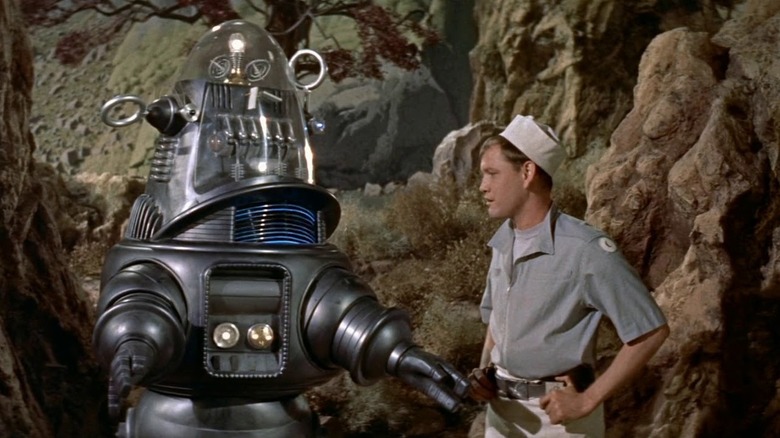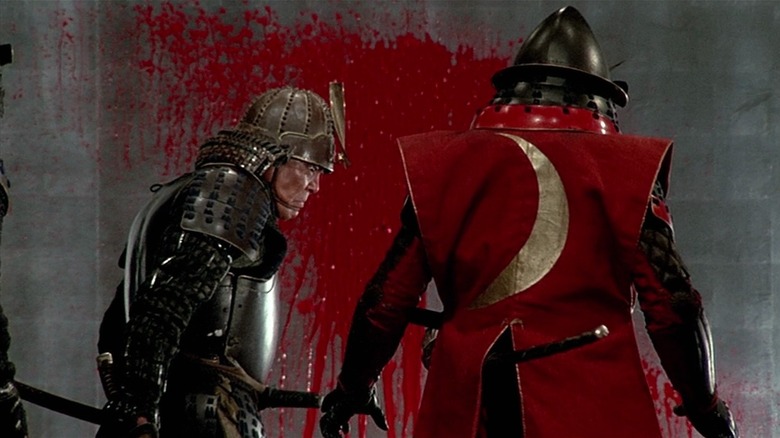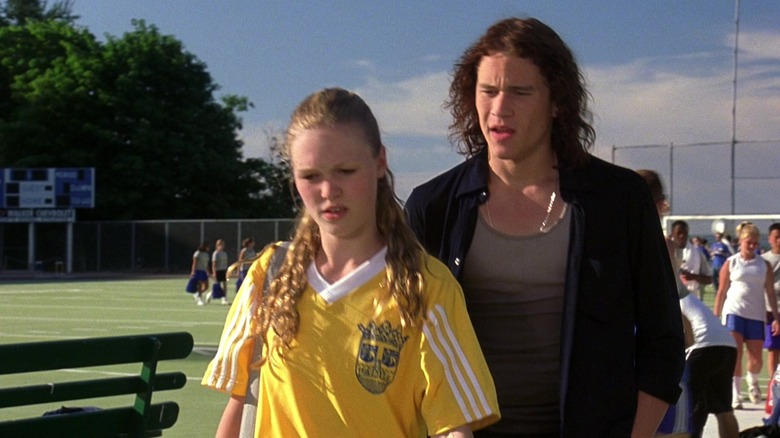15 Movies You Didn't Know Are Based On William Shakespeare Plays
Think The Bard is boring? If you're one of the millions forced to slog your way through William Shakespeare's plays during high school, you may think his language is too flowery, his style is too dated (despite the fact he wrote in Modern English), and his stories are out-of-touch with our day-to-day lives. Respectfully, dear reader, you are wrong. We bet you have seen and loved a Shakespeare story without even realizing it, as his plays have inspired numerous movies.
We're not talking word-for-word adaptations, like 2015's "Macbeth" starring Michael Fassbender; or even movies that use more...shall we say... "creative license," like Joel Coen's "The Tragedy of Macbeth", Baz Luhrmann's "Romeo + Juliet," or your average theatre director's revisionist steampunk-in-space version of "Cymbeline."
No, Shakespeare has inspired not just adaptations, but inspirations. "Original" movies spanning a host of genres that borrow heavily from The Bard. How heavily? Let's just say if Shakespeare were a modern Hollywood screenwriter, he could buy a palatial palace in the Pacific Palisades based on his residuals alone. While Shakespeare is credited with writing just shy of 40 plays, his most famous are the ones replicated most frequently, so you're bound to see some repeats. Let's give The Bard his due with 15 movies you didn't know were based on William Shakespeare's plays!
West Side Story - Romeo & Juliet
Picture Shakespeare as a Hollywood screenwriter pitching a project, probably hopped up on caffeine and coke (hey, it's Hollywood): "Two tragic teens from families who absolutely despise each other fall madly in love. Let's call it — 'Romeo & Juliet!'" Sounds like the makings of a hit, right? "Romeo & Juliet" is probably Shakespeare's most popular play because it's so relatable to the teenagers worldwide forced to read it.
So in the late 1950s, theatre producer Jerome Robbins figured it was ripe for a re-imaging, only this time set in New York City. Just replace Romeo and Juliet with Tony and Maria, and the Montagues and Capulets with the Sharks and Jets, throw in some timely racial tension, plus music and lyrics by Leonard Bernstein and Stephen Sondheim, and you have a hit. Boy, was it ever. Besides blowing up Broadway, both the 1961 original and Steven Spielberg's 2021 remake became two of the best Broadway musical adaptations ever, with the former winning the Academy Award for Best Picture.
Anyone But You - Much Ado About Nothing
Despite its cheeky title, Shakespeare's "Much Ado About Nothing" is about quite a bit, so maybe The Bard was just feeling himself. Set in the Italian city of Messina, "Much Ado About Nothing" finds Beatrice and Benedick spending the play arguing, while their friends plot to make them fall in love. Spoiler Alert: They do. And thus launched the romantic comedy sub-genre of "people who can't stand each other falling in love," e.g. Matthew McConaughey's pre- "McConaissance" career. Sure, that plot describes 50% of romantic comedies, but it was very literally the source material for one: "Anyone But You."
Sydney Sweeney plays Bea/Beatrice and Glen Powell plays Ben (c'mon now, that's totally 'Much Ado'), whose saucy hookup turns sour, but the bickering pair pretend to be the perfect couple at a destination wedding down under. Kenneth Branagh's "Much Ado About Nothing" adaptation did so-so business in 1993 despite starring Denzel Washington, Keanu Reeves, and Michael Keaton. "Anyone But You" earned ten times as much 30 years later, proving all Shakespeare was missing was Sweeney and Powell sparring in swimsuits.
She's The Man - Twelfth Night
Amanda Bynes became famous on Nickelodeon TV shows "All That" and "The Amanda Show" from showrunner, writer, and all-around creepshow, Dan Schneider. She tried to become a movie star with a piece from the greatest writer ever; William Shakespeare. Specifically, a reimagined Shakespeare's "Twelfth Night" — 2006's "She The Man."
"Twelfth Night" tells the tale of Viola, who dresses as a dude to get a job in the court of the Duke Orsino. She falls for him, but he longs after Countess Olivia – who falls for "Viola." Awk-Ward. "She's The Man" finds Bynes as Viola, a teenage soccer star who disguises herself as a dude to play boy's soccer after her prep school cuts the girls' team. So kinda the same? "She's The Man" launched a movie star, but it wasn't Bynes; it was Channing Tatum as Duke Orsino (get it?), the team captain. Sadly, Bynes' personal issues kept her the uber-talented comedienne from reaching her star power potential.
Throne of Blood - Macbeth
Besides being one of the best Japanese directors ever (make that one of the best directors period), Akira Kurosawa was also a well-read man who based his work on everything from paperback page-turners to Russian novels so heavy-duty they could double as a doorstop. Naturally, Kurosawa was drawn to William Shakespeare, and is the director behind some of the best of The Bard's cinematic interpretations. The first of Kurosawa's unofficial "Shakespeare Trilogy" was 1957's "Throne of Blood," which resets Shakespeare's "Macbeth" from 11th century Scotland to 16th century Japan.
Kurosawa mainstay Toshirô Mifune plays the samurai warrior Washizu, whose scheming spouse Asaji (Isuzu Yamada) manipulates him to murder his lord and take the throne (of blood) for himself. While "Throne of Blood" does hew closely to its Shakespearean source material, it's not a true adaptation, as the dialogue is different, while Kurosawa famously closes with Washizu getting waylaid with arrows, whereas Shakespeare's tragic figure was bested by a man not born of woman, Macduff.
My Own Private Idaho - Henry IV, Parts I & II, and Henry V
"My Own Private Idaho" may have the loosest connection to Shakespeare, but what would you expect from singular auteur, Gus Van Sant? In the 1991 film, River Phoenix and Keanu Reeves play Mike Waters and Scott Favor; one is a gay street hustler, the other is the mayor's ungovernable son. Calamity ensues when the Idaho-bound dudes depart Portland in search of Mike's mother. So yeah, that doesn't scream "Shakespeare," does it? Well, again, it's inspired by.
Favor (Reeves) represents the role of Henry V (Prince Hal in "Henry IV Part I"), a privileged yet degenerate youth who spends time among the seedy underground of his city, much to the chagrin of his Mayor father (Tom Troupe), a stand-in for Henry IV. Meanwhile, there's Bob Pigeon (William Richert), a middle-aged man who mentors street kids, a clear parallel to Shakespeare fan-favorite Falstaff. If you're watching "My Own Private Idaho" instead of reading "Henry IV, Part I," "Henry IV, Part II," and "Henry V," you'll sure to fail your test. But it's definitely worth watching for one of the late-great Phoenix's finest roles.
Deliver Us From Eva - The Taming of the Shrew
In the late 16th century, William Shakespeare penned perhaps his most famous romantic comedy, "The Taming of the Shrew." In the play, the lovely Bianca longs for Lucentio, but cannot be courted until her older sister Katherina marries. Enter the eccentric Petruccio, who marries Katherina and manages to corral her cantankerous tendencies, making her into an even more obedient wife than Bianca. Thus, the shrew is tamed. Oh, dear.
Okay, we admit it's a bit, uh, old-fashioned. But give The Bard a break, it was the 1500s. "Deliver Us From Eva" updates the scenario and setting for the 21st century. In the film, Gabrielle Union plays Eva, a meddlesome older sister who oversees the family trust coveted by her sister's husbands. To distract Eva from her duties, and get the cash they crave, the husbands hire a ladies man, Ray (LL Cool J), to woo her. But while trying to "tame" her, Ray finds himself falling for the one-of-a-kind Eva, instead. So that's slightly less problematic, yeah?
Get Over It - A Midsummer Night's Dream
Fresh off her career-making turn in 2000's "Bring It On," but before playing Mary Jane in Sam Raimi's record-breaking "Spider-Man" trilogy, Kristen Dunst managed to squeeze in "A Midsummer Night's Dream" by way of MTV — 2001's "Get Over It." Dunst plays Kelly, who hopes to draw the affection of her high school crush, Berke (Ben Foster) by snagging a role in a play, a musical adaptation of "A Midsummer Night's Dream" (laying it on thick, weren't they?) Trouble is, Berke can't act his way out of a paper sack, and only took the part to win back his ex-girlfriend.
Hilarity ensues, or is supposed to. The tagline, "Split Happens," was the most clever thing about this movie, which should have borrowed more liberally from The Bard. Joining Dunst were Mila Kunis, Zoe Saldana, and Colin Hanks in early career roles, 2000s "it girl" Carmen Electra, the always welcome Martin Short in a small part as an over-the-top drama teacher, and in an above-the-title starring role ... Sisqó ... "The Thong Song" guy ... right. Hey, what can we say, the early august were a weird time.
Warm Bodies - Romeo & Juliet
Sadly, there's no evidence to suggest that William Shakespeare was aware of zombies. Otherwise, he almost certainly would have made his immortal love story "The Tragedy of Romeo & Juliet" about them. Thankfully, we at least have "Warm Bodies," which reimagines the doomed romance with flesh-eating monsters...because the undead deserve love too, y'know.
Nicholas Hoult plays R, a zombie in a post-apocalyptic world where a plague has divided the population between the living and the undead. Enter Julie (Teresa Palmer), who becomes smitten (but not bitten) by R, and the two begin a bizarre romance that does the unthinkable; turns R more human. By the time "Warm Bodies" was released in 2013 the zombie movie genre had gone from scary ("28 Days Later"), to campy ("Evil Dead II"), to parody ("Shaun Of The Dead"), to mainstream ("The Walking Dead," "I Am Legend"). Remaking classic literature with zombies probably meant the genre had jumped the shark ("Pride & Prejudice & Zombies" soon followed) but at least "Warm Bodies" isn't as brain dead as some of its brethren.
The Bad Sleep Well - Hamlet
Three years after Akira Kurosawa made "Throne of Blood," his take on "The Tragedy of Macbeth," he filmed another loose adaptation of a Shakespearean tragedy, "Hamlet." Clearly Shakespeare's tragedies resonated with the Japanese director, though we're not sure how we would feel about Kurosawa adapting "The Merry Wives of Windsor" or "Two Gentlemen of Verona." Sounds kinda great, tbh.
The second film in Kurosawa's unofficial "Shakespeare Trilogy," 1960's "The Bad Sleep Well" takes place in contemporary corporate Japan. Toshirô Mifune plays Nishi, a shady schemer who climbs the corporate ladder by marrying his boss's daughter. But during the wedding reception, he is reminded how his father's suicide was swept under the rug, and vows vengeance for what happened. While "The Bad Sleep Well" certainly has elements of "Hamlet" in its tale of a son seeking revenge for his father's murder, the movie is film noir, through and through. Give credit to Kurosawa's cleverness as a storyteller, as he recognized that in many ways Hamlet, Shakespeare's hero of inaction, made the perfect noir protagonist.
Men of Respect - Macbeth
William Shakespeare wrote "The Tragedy of Macbeth" two centuries before the Sicilian Mafia began. It's a shame that Shakespeare died well before mob movies took off, as his keen awareness of the depths of human depravity in pursuit of soulless ambition would have made him perfect for the gangster genre. This is on full display in 1991's "Men of Respect," which transplants "Macbeth" to the streets of New York, with John Turturro as the mafioso Macbeth, Mike Battaglia. Mike's naked ambition is matched only by the machinations of his manipulative wife Ruthie (Katherie Borowitz), who spurs him to murder syndicate crime boss Charlie D'Amico (Rod Steiger).
But uneasy is the head that wears the crown (as Shakespeare wrote in "Henry IV, Part II"), as Battaglia's ascension to the head of the crime family takes a heavy toll, and he pays the ultimate price for his bloody pursuit of power. "Men of Respect" didn't win much respect from critics,though that has more to do with execution than the concept. "Macbeth" as a mob movie still makes a lot of sense, and given it has been 30-plus years since "Men of Respect," we hope some filmmaker tries again.
Big Business - A Comedy of Errors
Shakespeare's tumultuous tale of mistaken identity, "A Comedy of Errors," doesn't get enough love, which is a shame as its storyline is one of his funniest. Shenanigans ensue in what may be the first screwball comedy, as Antiphonus and his slave Dromio are separated from their identical twin brothers in a shipwreck. The two twins search for their respective twins, also named Antiphonus and Dromio, with comedic calamity ensuing. Got all that? Okay, now here's the synopsis for "Big Business."
Bette Midler and Lily Tomlin play a wealthy pair of twins who were separated from their real twins by a confused nurse some 40 years earlier. The fake twins' attempt to close down a factory and land a major business deal hits a snag with the unexpected arrival of their real twins, also played by Bette Middler and Lily Tomlin. The maestro overseeing this madness was Jim Abrahams, co-director of "Airplane!," director of "Hot Shots!," and co-writer of "The Naked Gun," who brings his madcap sensibilities to Shakespeare's story. Just as more people should know about "A Comedy of Errors," more moviegoers should see "Big Business."
Forbidden Planet - The Tempest
"The Tempest" is believed to be William Shakespeare's last play and he certainly went out with a bang. Actually, a storm. "The Tempest" tells the tale of Prospero, a magician who conjures a storm to capture the survivors of a shipwreck on his enchanted island. The survivors include the King of Naples, Prospero's brother, and the king's son. Alas, things get complicated, as Prospero's slave, a man-monster named Caliban, tries to escape from his master, while the king's son falls for Prospero's daughter.
The 1956 sci-fi classic "Forbidden Planet" replaces Prospero's island with Altair IV, where the mad scientist Dr. Morbius (Walter Pidgeon) lives alone with his daughter (Anne Francis) and his robotic slave, Robby The Robot (who even gets his own screen credit). When a crew led by Commander Adams (Leslie Nielsen) arrives on the planet, they discover the doctor's dark secrets, and what happened to the planet's other inhabitants. While sci-fi cinema based on Shakespeare sounds like a stretch, "Forbidden Planet" is far from schlock, as we imagine The Bard himself would be at the edge of his seat throughout this thriller.
Ran - King Lear
Akira Kurosawa concluded his unofficial "Shakespeare Trilogy" by adapting arguably The Bard's magnum opus, and in so doing directed one of his own. After a lifetime of violent conquest the Great Lord Hidetora Ichimonji (Tatsuya Nakadai) decides to divide his domain between his three sons, with his oldest son ruling. Alas, his defiant third son refuses to bend the knee to his older brother, and under the meddling influence of his malevolent wife, Lady Kaede (Mieko Harada), wages a war on his brothers that burns their father's kingdom to the ground.
"Ran" is one of the greatest ancient war movies, and its Shakespearean source material is a major reason why. The movie is based mostly on Shakespeare's "King Lear," with a touch of "Macbeth" mixed in for good measure; the major differences are King Lear divided his kingdom amongst his daughters, not sons, while Kurosawa added some spice with the youngest son's Lady Macbeth-like wife. "Ran" was released in 1985, a quarter of a century after "The Bad Sleep Well," but finds the master filmmaker at the absolute apex of his art.
10 Things I Hate About You - The Taming of the Shrew
There are millions of millennials, twenty-somethings, and Gen Z tweeners who are familiar with William Shakespeare's "The Taming of the Shrew" even if they don't even realize it. The reason is the classic teen comedy, "10 Things I Hate About You," which has introduced countless people to Shakespeare's story more than a quarter century since its release (and there are plenty movies a lot like it).
Julia Stiles stars as Kat (don't call me Katherina) Stratford, the acerbic older sister to the bubbly and boy-hungry Bianca (Larisa Oleynick), the latter of whom is not allowed to date until Kat gets a boyfriend. Bianca's would-be beau Cameron (Joseph Gordon-Levitt) concocts a scheme, hiring high school scoundrel Patrick (Heath Ledger) to date the antisocial Kat. It goes to show Shakespeare's timeless brilliance that his 400-plus-year-old story can still appeal to teens in the right context. But credit also belongs to the movie's clever script, and especially the across-the-board performances, that give us way more than ten things to love about "10 Things I Hate About You."
The Lion King - Hamlet
"To be or not to be, that is the question," Shakespeare's Hamlet bemoans in the most famous soliloquy in all of literature. "Hakuna Matata means no worries for the rest of your days" preaches a very different kind of prince, Simba, in Disney's "The Lion King," the most successful Shakespeare adaptation in movie history, with $1.2 billion domestically and $3.4 billion worldwide for the entire franchise. In fact, in 1994, the original animated "The Lion King" topped the year, out-earning the number two film, "Forrest Gump," by more than two to one, while the 2019 live-action remake earned more than any movie not named "Avengers: Endgame."
So, how is "The Lion King" inspired by "Hamlet?" Well, Simba fills in for the tragic prince of Denmark as the rightful heir whose father is murdered by his evil uncle Scar (King Claudius in the play). While Simba/Hamlet tries to run away from his problems, the spirit of his murdered old man (Mufasa/Ghost) compels him to action. Throw in Timon and Pumbaa as Rosencrantz and Guildenstern, Rafiki as Horatio, Nala as Ophelia, and you can see that ol Bill Shakespeare practically donned the mouse ears with "The Lion King. Fortunately, Simba had a happier ending.

